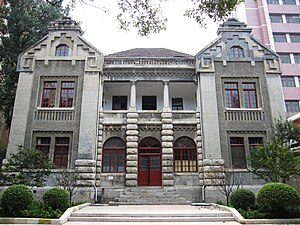Jinan Incident
| Jinan Incident / May 3 Tragedy | |||||||
|---|---|---|---|---|---|---|---|
|
Former foreign office building in Jinan, site of the execution of Cai Gongshi |
|||||||
|
|||||||
| Belligerents | |||||||
| Casualties and losses | |||||||
| 6,123 people and soldiers massacred or killed Thousands more wounded |
14 civilians killed 26 soldiers killed 157 soldiers wounded |
||||||
The Jinan incident (Wade-Giles: Tsinan Incident, Japanese: 済南事件) or May 3 Tragedy (simplified Chinese: ; traditional Chinese: ; pinyin: ), was an armed conflict between the Japanese Army allied with Northern Chinese warlords against the Kuomintang's southern army in Jinan, the capital of Shandong in 1928 during the Kuomintang's Northern Expedition.
During the Northern Expedition, troops of the Chinese National Revolutionary Army attacked several foreign consulates in a fervor of anti-imperialism in what became known as the Nanjing Incident of March 1927. Chiang Kai-shek sought to avoid repetition of such incidents, and in November 1927 he met with Tanaka Giichi, who had become Japan's premier in April of that year (and also held the portfolio of Foreign Minister) in part, on the strength of promises to take more active and aggressive measures than his predecessor toward protection of Japanese lives, property, and economic interests in China. Chiang had only a tenuous hold on power in China and relied in large measure on the promise to end foreign domination and re-unify the country to buttress his legitimacy.
...
Wikipedia

